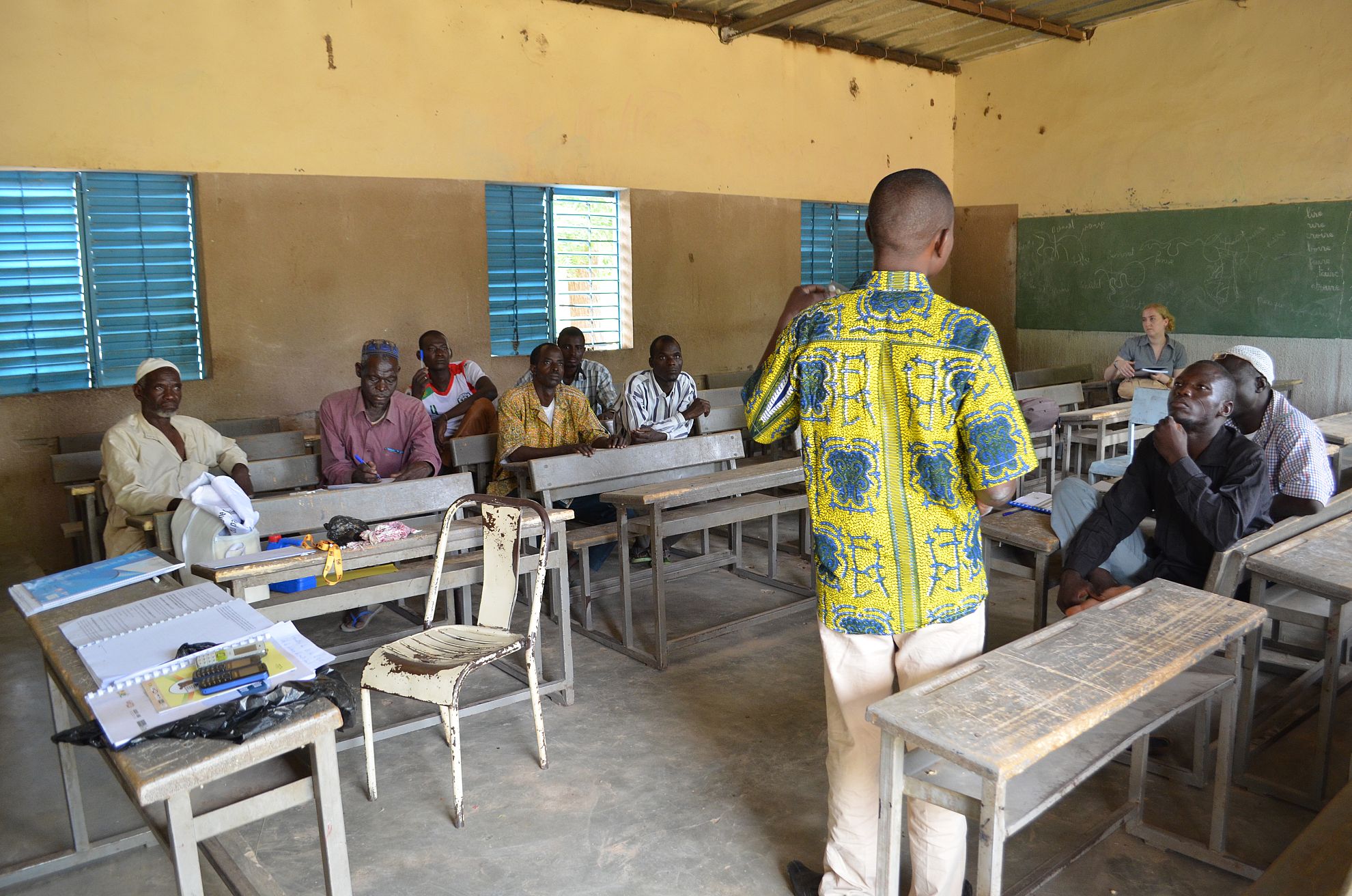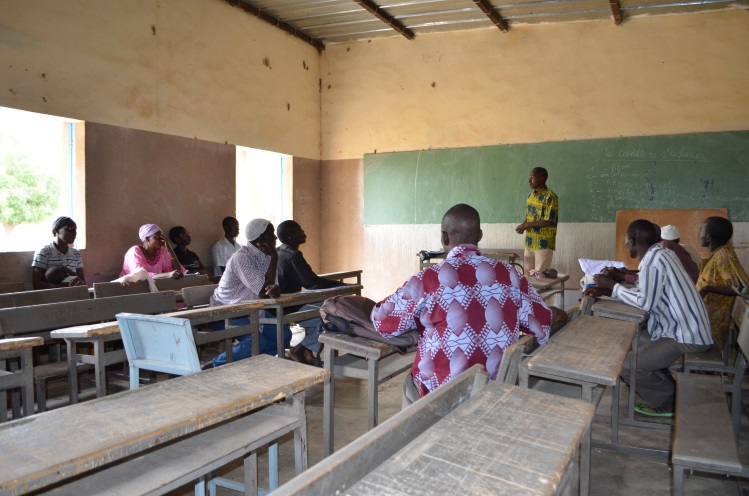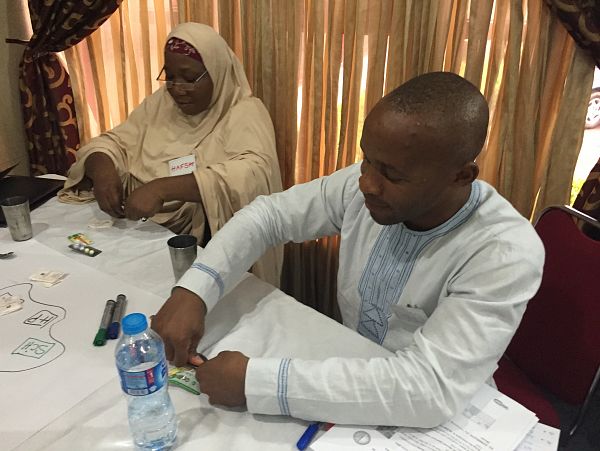
ACCESS-SMC trains over 28,000 health workers in preparation for SMC distributions
25 August 2015In the run up to the launch of SMC distributions, ACCESS-SMC partners collaborated with the seven supported countries, working with National Malaria Control Programs (NMCP) and other government representatives, to train a total of 28,771 people in the distribution and administration of sulphadoxine-pyrimethamine + amodiaquine (SP+AQ) to children aged three to 59 months.

For six of the seven supported countries, SMC is not a new intervention, though to date it has only been carried out at small scale. For this reason, Malaria Consortium and its partners worked with NMCPs to adapt the training depending on prior experience, identified strengths and weaknesses, to make it a relevant and valuable experience for all involved. While the individual modules were chosen and molded to the local context, the approach adopted to roll out this training was universal: the cascade approach. This approach was chosen predominantly because it allowed large numbers of Community Health Workers (CHWs) to be trained at scale over a short period of time.

Three main cadres of health workers were responsible for the delivery of SMC drugs to eligible children in each country: Community Health Workers, Health Facility Workers and Supervisors. In addition there were three different groups responsible for conducting the training, these were:
SMC Facilitators: responsible for training Master Trainers to be able to train National Trainers on the entire SMC Curriculum.
Master Trainers (MT): responsible for training National Trainers to teach the CHWs, Supervisors and Health Facility Workers the various components of the SMC curriculum.
National Trainers (NT): responsible for training CHWs, Supervisors and Health Facility Workers on the selected SMC curriculum modules.
 In Burkina Faso: On 30th July, the training of CHWs in many districts across Burkina Faso took place in preparation for the launch of the distributions the following day. Trainings of CHWs were carried out only a few days prior to the launch of distributions in each supported country, in order to ensure that the key messages and practices remained at the forefront of their minds, ready for implementation.
In Burkina Faso: On 30th July, the training of CHWs in many districts across Burkina Faso took place in preparation for the launch of the distributions the following day. Trainings of CHWs were carried out only a few days prior to the launch of distributions in each supported country, in order to ensure that the key messages and practices remained at the forefront of their minds, ready for implementation.
In a school classroom in the village of Sapaga, Zorgho, 20 men and women, CHW volunteers, gathered to be trained in administering SMC. The National Trainer spoke in Mooré, the local dialect, taking the CHWs through the key stages of SMC administration, from confirming the eligibility of a child to observing for any adverse reactions to the SMC treatment and the importance of correctly filling in the register. During the implementation itself, groups of supervisors attended and observed the administration of the SMC treatment in all villages and districts across the country, ensuring that the practices taught during training were correctly put into action. Feedback from the supervisors will help the CHWs improve in their approach to SMC administration, ready for the next cycle of distributions next month.
In Chad: From 11th – 13th June, Malaria Consortium’s partner, Centre de Support en Santé Internationale (CSSI) held the training of National Trainers. Over the course of the three days, particular emphasis was put on the importance of pharmacovigilance, with Dr. Kodbesse, representative from the NMCP Chad, stressing that the correct and timely filling in of forms is “as important as administering the drugs themselves. Not doing so can be a cause of failure of your SMC campaign and can endanger children’s lives.”
In Nigeria: Over 8,000 Health Facility Workers, Supervisors and Community Health Workers were trained in the space of just 21 days in order to ensure that all necessary training had been completed, ready for the kick-off of drug distributions.
 The ACCESS-SMC training of master trainers took place in Abuja over four days, with participants including doctors, nurses and pharmacists from many states across the country. Members of the National Agency for Food and Drug Administration and Control were also present and contributed to sessions on pharmacovigilance, while the NMCP SMC focal person also attended the training, demonstrating essential national ownership of the project.
The ACCESS-SMC training of master trainers took place in Abuja over four days, with participants including doctors, nurses and pharmacists from many states across the country. Members of the National Agency for Food and Drug Administration and Control were also present and contributed to sessions on pharmacovigilance, while the NMCP SMC focal person also attended the training, demonstrating essential national ownership of the project.
To read more about the trainings that took place, click here.
Take a look at some photos of the training sessions here.
Latest news
- Malaria Consortium honoured by Ugandan government for contribution to combat malaria23rd April 2024
- International summit calls for AMR accountability in public health interventions21st March 2024
- Global SMC community celebrates new milestone at SMC Alliance Annual Meeting in Nigeria6th March 2024
- Scaling up key interventions could halve pneumonia-related childhood mortality13th February 2024
- Malaria Consortium and eGov Foundation join Mozambique’s national malaria programme to digitalise seasonal malaria chemoprevention campaigns8th February 2024
- World’s first malaria vaccine rollout launched in Cameroon22nd January 2024